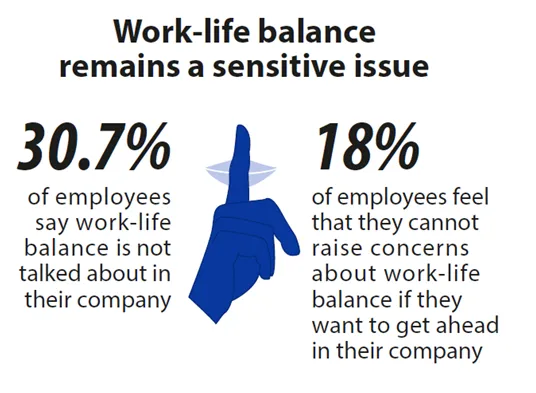
Why work-life balance is a must in Hong Kong
By Amanda YikThe recent forming of the Standard Working Hours Committee has once again sparked discussions around how to keep Hong Kong’s economy healthy and competitive.
Numerous researches across the world show that work-life balance is critical to long term business success. The 2012 survey “The State of Work-Life Balance in Hong Kong”1 shows that 82% of employees say work-life balance is a critical factor when it comes to productivity, level of engagement, attraction and retention of talent. (See Figure 1.)
However, the same survey shows more than 30% employees say that work-life balance is not talked about in their company.
Another 18% feel that they cannot raise concerns about work-life balance if they want to get ahead in their company. This is despite the fact that the discussion around standard working hours had been taking place during the survey period.
So why isn’t work-life balance top-of-mind for Hong Kong people and businesses? There are 3 key reasons:
We do not really understand what work-life balance is:
Work-life balance is not about shorter or standardized working hours. There is no hard and fast definition we can pull off the shelf and say “this is it - we have achieved work-life balance”.
On the other hand, it is not rocket science either. When we ask people what could help them get better work-life balance – using examples in their daily life - we often get answers like “being able to have dinner with family more often on weekdays” or “no need to check Blackberry when I go on holiday” or “leave office at 5pm every Tuesday and Thursday so I can attend classes”.
Ultimately, people want to have the flexibility and some control over when, where and how they work so that they can work effectively and attend to personal needs as well.
We become defensive when the term ‘work-life balance’ is within earshot:
Work-life balance is a term that evokes mixed feelings. Often, bosses and managers become wary because they believe that work-life balance means less work or lower productivity.
High-flyers who are capable and ambitious claims they don’t worry about work-life balance because they can handle everything just fine. Some people become bitter and think that work-life balance is idealistic and “to have it all” is simply impossible.
All this ignores the fact that we are constantly making choices between work and personal life. LinkedIn’s March 2013 survey shows that two-thirds of women globally see success as finding the right work-life balance.
Work-life balance is one of the indicators on OECD’s Better Life Index. To dismiss work-life balance as elusive is denying a fundamental human need.
We think we can get away with not addressing work-life balance:
Work-life balance is a fluid concept and the road to better work-life balance is always a work-in-progress. There are no “one-size-fits-all” or “once-and-for-all” solutions. Because there are no apparent quick fixes, this topic easily gets dismissed as a low-priority item in the corporate agenda.
There are always something more urgent – budget, business development, headcounts, relocating people, expansion into new markets, and the list goes on. With an uncertain economic outlook, layoffs and headcount freezes, companies may have become complacent about their ability to attract and retain talent.
What companies need to remember is this: whether you like it or not - employees are the most powerful and trusted spokespeople of a company. Employees rank higher in public trust than a firm’s PR department, CEO, or Founder, according to Edelman’s 2013 Trust Barometer.
Companies that want to build a productive, engaged and satisfied workforce need to take a serious look at how they support their employees to achieve what they want both in and outside of work.
The war for talent in Asia is not cooling off. Taking a proactive, strategic approach will help nip any work-life challenges in the bud and get you ahead of the curve when economies across the world start to recover.
________________
1 "The State of Work-Life Balance in Hong Kong", Community Business, 2012.




















 Advertise
Advertise







